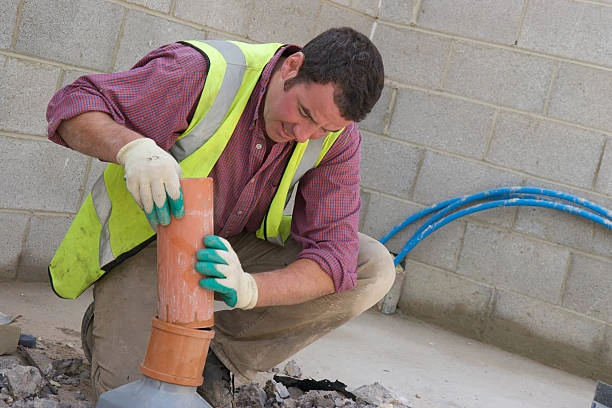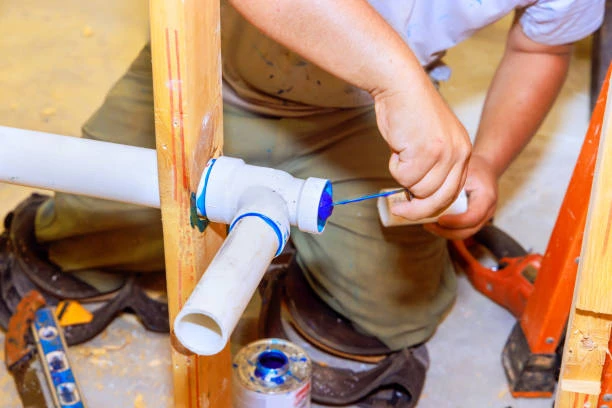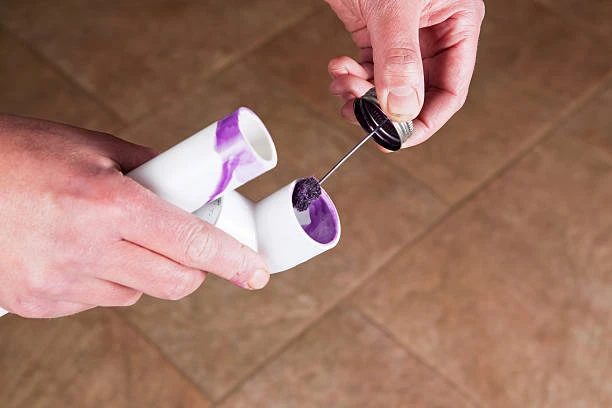Polyvinyl chloride (PVC) pipe is widely used in plumbing systems, from residential homes to large commercial buildings. It is praised for its low cost, ease of installation, and durability. However, recent investigations by plumbers and health experts are raising significant concerns about the long-term health risks associated with the use of Polyvinyl Chloride pipe in plumbing systems. These concerns focus on potential chemical leaching and other environmental hazards. In this article, we will examine why Polyvinyl Chloride (PVC) pipe is considered a health hazard, the risks of its use, and safer alternatives for plumbing systems.
What Is Polyvinyl Chloride Pipe?
Polyvinyl chloride pipe, often called PVC pipe, is a type of plastic made from a synthetic polymer. It is one of the most commonly used materials in plumbing and construction because of its affordability, resistance to corrosion, and ease of installation. PVC pipe is used for both cold and hot water plumbing, as well as drainage, sewage systems, and electrical conduit.
Despite its widespread use, PVC pipe contains chemical additives and plasticizers that can leach into drinking water over time. Some of these chemicals are harmful to human health and the environment, which has raised alarm among health experts and plumbers.
Plumbers Express Concerns About Polyvinyl Chloride Pipe
While PVC pipe has been a staple in plumbing for decades, plumbers are becoming increasingly concerned about its long-term health risks. These concerns stem from the chemicals present in PVC that may leach into the water supply, especially in older plumbing systems or in situations where pipes are exposed to high temperatures.
1. Chemical Leaching from Polyvinyl Chloride Pipe
One of the main concerns regarding Polyvinyl Chloride pipe is the leaching of harmful chemicals into the water supply. PVC pipes are made from polyvinyl chloride resin, which is combined with additives like phthalates, lead, and bisphenol A (BPA) to increase flexibility and improve performance. Over time, these chemicals can seep into the water running through the pipes.
Phthalates, in particular, are known to be endocrine disruptors. They can interfere with hormone function and have been linked to a range of health problems, including developmental issues, reproductive problems, and an increased risk of certain cancers. While newer PVC pipes may have reduced amounts of phthalates, older pipes are more likely to contain higher levels of these harmful chemicals.
2. Long-Term Health Risks of Polyvinyl Chloride Pipe
The long-term health risks associated with Polyvinyl Chloride pipes come from prolonged exposure to chemicals that leach from the pipes into drinking water. Studies have shown that these chemicals can accumulate in the body over time and may lead to serious health issues.
Some potential risks include:
- Cancer: Certain chemicals used in PVC manufacturing, such as vinyl chloride, have been linked to an increased risk of liver cancer and other types of cancer.
- Hormone Disruption: Chemicals like BPA and phthalates disrupt hormone levels, which can cause reproductive issues, developmental delays, and other health problems.
- Neurological Problems: Long-term exposure to certain chemicals may negatively affect the nervous system, leading to cognitive or developmental issues, particularly in children.
In addition to these risks, PVC pipes may also become brittle over time, especially when exposed to UV light or heat. This can lead to pipe breakage or leaks, causing further contamination of water.
3. PVC Pipe and Its Impact on Drinking Water
PVC pipes are commonly used for drinking water systems in homes, schools, and businesses. However, the leaching of chemicals into drinking water is a significant concern. When water passes through aging PVC pipes, it may come into contact with substances like lead or BPA. These chemicals can then contaminate the water supply, potentially leading to long-term health problems for those consuming it.
The impact of these chemicals is especially concerning for children, pregnant women, and vulnerable populations. Prolonged exposure to water contaminated by PVC pipe chemicals may lead to developmental and reproductive issues, along with other serious health effects.
The Environmental Impact of Polyvinyl Chloride Pipe
In addition to the health risks, the environmental impact of PVC pipe is another reason why experts are urging homeowners and businesses to reconsider its use. PVC is a petroleum-based plastic, and its production process releases harmful pollutants into the environment.
1. PVC Production and Pollution
The manufacturing process for Polyvinyl Chloride pipe involves the use of toxic chemicals, including vinyl chloride, a known carcinogen. The production of PVC pipe also contributes to air pollution and greenhouse gas emissions. PVC plastic is non-biodegradable, meaning it can persist in the environment for hundreds of years.
When PVC pipes are disposed of at landfills, they can release harmful chemicals into the soil and groundwater. The widespread use of PVC pipes, combined with their environmental impact, has led many to question their sustainability as a long-term plumbing solution.
2. PVC Pipe Recycling Challenges
PVC pipe is difficult to recycle due to the chemical additives used in its production. While some attempts have been made to recycle PVC pipe, the process is complex and costly. As a result, most PVC pipes end up in landfills, contributing to long-term environmental pollution.
This difficulty in recycling makes PVC an unsustainable choice in the long run, especially as more sustainable alternatives become available.

Healthier Alternatives to Polyvinyl Chloride Pipe
Given the health risks associated with PVC pipes, many people are looking for safer, more sustainable alternatives for their plumbing systems. Fortunately, several materials are available that can replace PVC and provide a safer, more environmentally friendly option.
1. Copper Pipes
Copper has been used for plumbing for centuries and is considered one of the safest and most reliable materials for water systems.
While copper pipes are more expensive than PVC, they are highly durable and generally safer for long-term use.
2. PEX Pipes (Cross-Linked Polyethylene)
PEX is flexible, durable, and resistant to both freezing and chemical corrosion. Unlike PVC, PEX pipes do not contain harmful chemicals like phthalates or BPA, making them a safer choice for plumbing systems.
PEX is also easy to install, as its flexibility allows it to bend around corners without the need for additional fittings. While PEX pipes are still a relatively new option, they have gained popularity due to their affordability and ease of use.
3. Cast Iron Pipes
Although heavier and more expensive, cast iron pipes are a durable and non-toxic option for plumbing systems. Cast iron pipes are resistant to corrosion and don’t leach harmful chemicals into the water. They also have the advantage of being very quiet when water flows through them, as they absorb sound better than PVC or metal pipes.
However, cast iron pipes can rust over time, leading to blockages and leaks. They are also harder to install and may not be ideal for all plumbing systems.
How to Reduce Your Exposure to PVC Pipe Hazards
If you currently have PVC pipes in your home or business, there are steps you can take to minimize the potential health risks:
1. Regularly Inspect Your Plumbing System
Older PVC pipes may be more prone to degradation, so it’s important to regularly inspect your plumbing system. If you notice signs of wear or cracking, it may be time to replace the pipes with a safer material like copper or PEX.
2. Install a Water Filtration System
Using a water filtration system can help reduce the potential for harmful chemicals leaching from PVC pipes into your drinking water. High-quality filters can remove contaminants like lead, chlorine, and VOCs, improving the quality of your water and reducing the risk of exposure to harmful chemicals.
3. Consider Replacing PVC Pipes with Safer Materials
If you are in the process of remodeling or building a new home, consider replacing PVC pipes with safer alternatives like copper or PEX. These materials offer the same functionality but without the health risks associated with PVC.
Conclusion: The Growing Concerns Over Polyvinyl Chloride Pipe
Polyvinyl chloride pipe has been a popular choice in plumbing systems for many years due to its affordability and ease of use. However, health experts and plumbers are increasingly concerned about the long-term risks of using PVC pipe, especially in drinking water systems. The chemicals in PVC, such as phthalates and BPA, can leach into water and pose serious health risks, including cancer and hormone disruption.
As awareness of these risks grows, many homeowners and businesses are opting for safer alternatives like copper and PEX pipes. If you have PVC pipes in your plumbing system, consider taking steps to reduce your exposure to harmful chemicals by regularly inspecting your pipes and using water filtration systems. Ultimately, replacing PVC with safer materials will protect both your health and the environment.
FAQs About Polyvinyl Chloride Pipe and Health Risks
1. Are PVC pipes safe for drinking water?
PVC pipes are generally safe when new, but over time, chemicals can leach into drinking water, posing health risks.
2. What chemicals are found in PVC pipes that are harmful to health?
Chemicals such as phthalates, BPA, and lead may leach from PVC pipes and disrupt hormones or lead to cancer.
3. Can PVC pipes cause long-term health problems?
Yes, long-term exposure to chemicals from PVC pipes can lead to health problems such as hormone disruption and cancer.
4. What are some alternatives to PVC pipes?
Copper, PEX, and cast iron are safer alternatives to PVC for plumbing systems.
5. How can I protect my family from PVC pipe hazards?
You can regularly inspect your pipes, install a water filtration system, and replace PVC with safer alternatives.


















